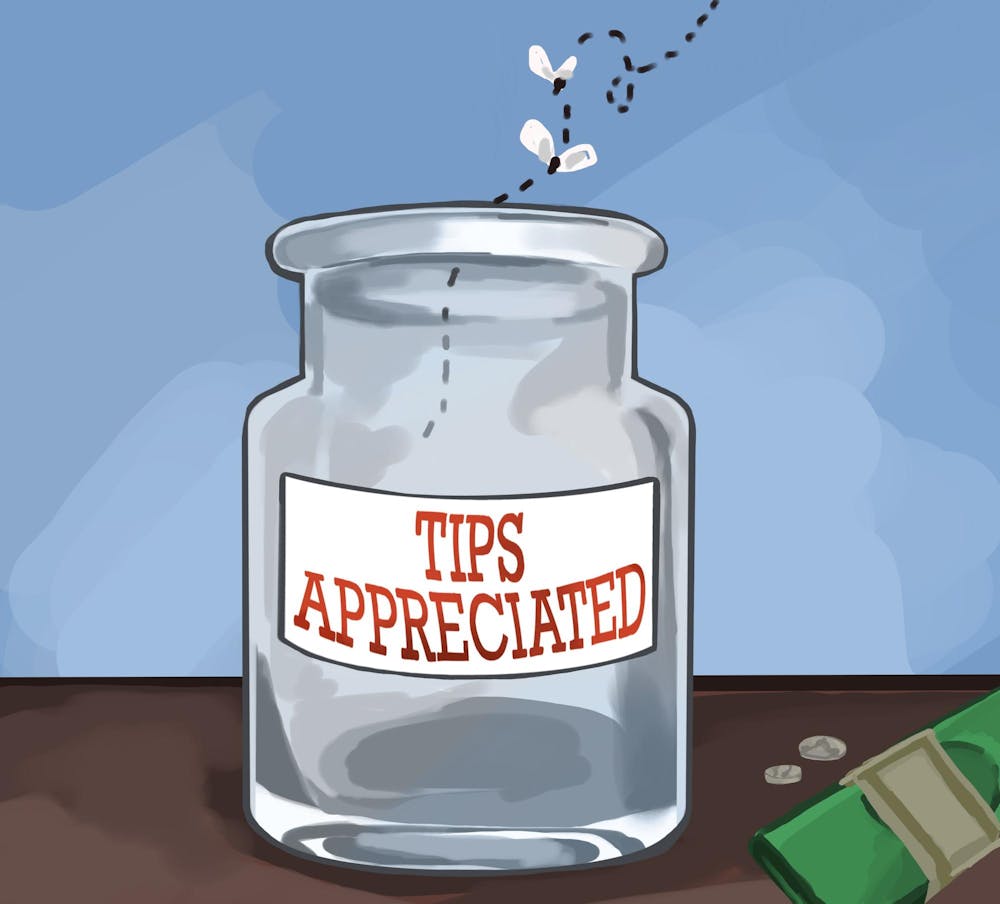Americans have been ambivalent about tipping culture for years, unsure of when and how much to tip — if at all. But in tip-earning jobs employees are often paid a subminimum wage, relying heavily on customer gratuity for their income. Unfair wages have led some states to eliminate subminimum pay and increase hourly wages for those workers. While there are many economic and ethical reasons for paying servers more, one of the most pertinent yet overlooked reasons is cultural. Raising hourly wages for servers would eliminate the need for tips and help restore dining to a cultural experience, not just an economic exchange.
Over the past two summers I worked as a waitress and my hourly wage was only $3.00 per hour. In Texas, where I’m from, the minimum wage for servers is $2.13 an hour, making tips the primary source of a worker’s income. Rhode Island is the same, with the minimum wage for servers set at $3.89. In my experience, a waiter will serve four to six tables during a shift. Therefore they must ensure customers remain satisfied with their service and get parties in and out as fast as possible. Consequently, customers feel like they are being inconsiderate if they overstay their welcome. These factors contribute to a dining experience that is often rushed and reduced to a superficial monetary exchange.
Comparatively, at a fine dining restaurant, where generous tips are expected, it isn’t considered rude or inconsiderate to stay at the table and talk long after the meal is over. Customers will tip well not only because prices are higher but also because the server is trained to guide you through a gastronomic experience. While this sounds like a mutually advantageous agreement, it turns what is considered customary in other countries into a luxury reserved only for those who can afford it.
A few weeks ago, in my Spanish section, I learned the term “sobremesa.” Its direct translation of “upon the table” doesn’t do it justice. Sobremesa, the custom of deep conversation after a meal, is a hallmark of Latin cultures, transcending its etymological origins Those who practice it spend hours enjoying each other’s company by engaging in meaningful conversation, with topics ranging from food to politics to philosophy.
Sobremesa isn’t unique to Latin America and Spain. It’s true that many American families will sit and talk after a meal in the comfort of their own homes and that’s a good place to start. But conversations at home are often confined to an echo chamber. It’s all too easy to walk away from the table when the energy lulls or gets tense. Sobremesa shouldn’t be insular. When it is, we lose a means of cultural development. Restaurants have the potential to be rich hubs of cultural exchange — spaces that facilitate longer, more substantive discussions. But this is not possible with today’s tipping culture. Subminimum pay not only denies workers a steady income but also inhibits meaningful dining experiences from taking root here in America.
It doesn’t have to be this way. States should ensure that all workers, even those who receive tips, are guaranteed a higher minimum hourly wage. If servers are guaranteed a full day’s pay at the outset of their workday, there would be less pressure for efficient turnover. No matter what establishment a customer dines at, they would be welcome to sit and conversate after their meal.
I’m not suggesting that we get rid of tips altogether. Rather, instead of being obligated to tip one-fifth of the price of a meal, customers could tip 10-12%, and workers should be paid adequately. Tipping would no longer be an exercise of monetary power; instead, it would be a token of gratitude. Raising the minimum wage is more than an equity issue — it may just be the key to unlocking a more enjoyable dining experience.
Kendall Ricks ’27 can be reached at kendall_ricks@brown.edu. Please send responses to this column to letters@browndailyherald.com and other opinions to opinions@browndailyherald.com.





